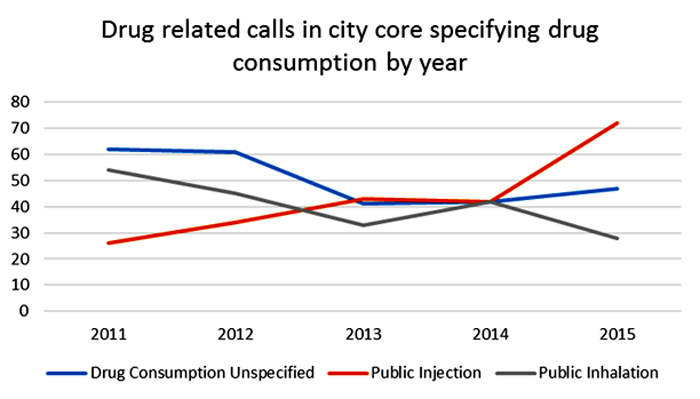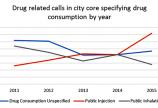Washrooms becoming de facto consumption sites

Washrooms in Victoria, particularly those in homeless shelters and social service agencies, have become de facto drug consumption sites in a city experiencing both high rates of homelessness and illicit drug overdoses, shows a new report, released today by researchers with the University of Victoria’s Centre for Addictions Research of BC (CARBC) in advance of International Overdose Awareness Day tomorrow.
A stated objective of the provincial government’s declaration of a public health emergency was to increase monitoring of non-fatal overdose incidents in the province, including tracking of overdose locations and drugs used. The CARBC report provides information on illicit drug use and overdose events in Victoria, including environmental factors contributing to overdoses.
UVic researchers and the report’s co-authors Bruce Wallace and Bernie Pauly say drug use and overdose data from the Victoria area show the inadequacy of governments’ response and demonstrate the urgent need for a comprehensive harm reduction plan that includes supervised consumption services.
Wallace stresses that people who use illicit drugs are seeking alternatives to injecting in public, but that washrooms are a risky option because of their unsanitary conditions and because washrooms available in many settings typically don’t allow additional people to be present who can monitor and respond to adverse reactions.
“Given the evidence of the effectiveness of supervised consumption,” says co-author Pauly, “we cannot delay the implementation of supervised consumption services. We cannot keep putting people at risk of overdose and infection when we know the solution.”
Montreal’s application for a supervised consumption site is currently under federal review. Vancouver (with the only legal sites in Canada) has five more sites under development. Other cities preparing applications include Toronto, Edmonton, Ottawa and Victoria.
Other key findings include:
• Victoria police data show that overdose-related calls more than doubled in 2015 from previous years and calls were primarily from health and social service agency locations where harm reduction supplies are provided.
• CARBC’s Alcohol & Other Drug (AOD) High Risk Populations Monitoring Study found 43 per cent of those surveyed reported using washrooms in local nongovernmental organizations as a site to consume drugs in the last year. Reported use in local agency washrooms doubled (28 per cent to 58 per cent) between the first wave of AOD data collection in 2015 (January to March) and the second wave (July to August).
• There is a high frequency of overdose events in shelters requiring staff to respond by administering Naloxone and calling 911—an inadequate response to the crisis, and one causing stress and emotional trauma for shelter staff.
Moreover, Wallace emphasizes, the overdose-reversing Naloxone kits that are increasingly being distributed should serve only as a last resort: “Naloxone does not prevent overdoses. It is administered after an overdose and can help prevent overdose deaths. But in light of these findings, we need a more comprehensive approach that includes supervised consumption, drug testing as well as increased access to treatment and opiate substitution therapy.”
International Overdose Awareness Day is a global event held annually on Aug. 31 to raise awareness of overdose and reduce the stigma of a drug-related death.
A media kit including author photos, Victoria police call data (Excel) and graph (png) is available via Dropbox.
-- 30 --
Photos
Media contacts
Bruce Wallace (Centre for Addictions Research/School of Social Work) at 250-721-6275 or barclay@uvic.ca
Bernie Pauly (Centre for Addictions Research/School of Nursing) at 250-472-5915 or bpauly@uvic.ca
Denise Helm (University Communications + Marketing) at 250-721-7656 or dhelm@uvic.ca
In this story
Keywords: drugs, addiction, health, community, Canadian Institute for Substance Use Research
People: Bruce Wallace, Bernie Pauly







